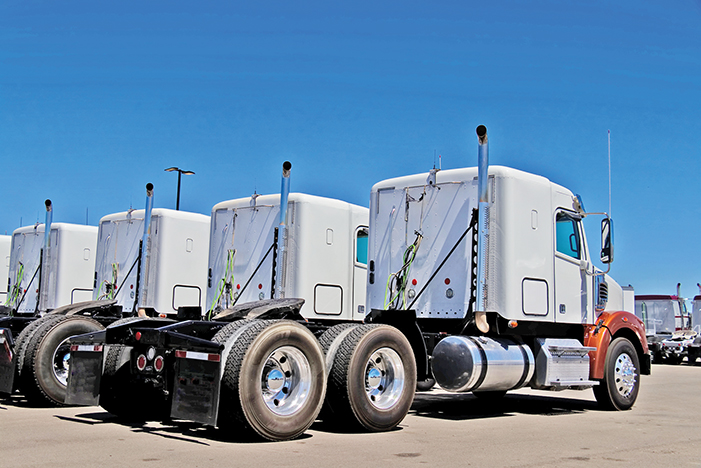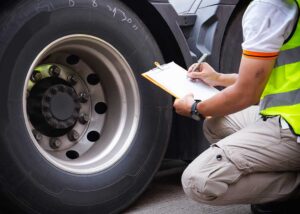Used truck prices have come down from last year and freight rates have been steadily rising for the past four months. For some drivers, the time is right to consider truck ownership. Others might be thinking of replacing their current equipment before prices start rising again.
Unfortunately, some would-be owner-operators make buying decisions following only a few considerations, overlooking some important items that should be on their check-off list.
The truck model is important, of course, but there’s more to consider than cosmetics and resale value. You’ll need service at some point, and you’ll need to know if it will be available. Does that model have service centers in the areas you plan to run? Is one of those centers near your home so repairs can be made while you’re taking time off?
Many buyers fail to consider the “double cost” of truck repairs. Not only can repairs be expensive, but also, the truck earns no revenue while in the maintenance bay. Even repairs that are covered under warranty can cost thousands of dollars in lost loads while the truck is down. Does your service facility have an adequate stock of parts, or does every repair require waiting while parts are shipped in from somewhere else?
Resale value will have greater importance if you plan to trade your truck more often. If you don’t plan to sell or trade it quickly, resale value isn’t as important.
When it comes to specifications, there is much to consider. Large carriers, which are responsible for many of the used trucks on the market, order trucks that are configured to fit their business needs; those specifications may not be right for your business.
Engine size is one example. Smaller displacement, 13-liter engines are gaining in popularity due to their lighter weight and fuel economy. If you’re planning on higher average speeds or heavier average load weights, you may choose to stay with the tried-and-true 15-liter engines.
Trucks with automated manual transmissions (AMTs) are becoming very popular among carriers and are increasingly available on the used truck market. These differ from “automatic” transmissions in that they don’t have torque converters or depend on transmission fluids. Instead, they are essentially manual transmissions, with the shifting controlled by computer. Carriers like AMTs for durability and fuel savings, plus AMTs enhance a company’s ability to hire drivers who haven’t trained on manual transmissions.
Many owner-operators still prefer manual transmissions, especially the 13- and 18-speed models that allow the driver to “split” gears. Sometimes this preference is justified by load type, while sometimes it’s based on tradition and, to an extent, pride. Your decision might be based on availability, expected use of the truck and your ability to hire a driver for your truck.
Another option that’s gaining popularity is the 6×2 axle configuration. With this setup, only one axle on the tractor actually pushes the vehicle. This option saves weight and can save tire wear if one axle lifts. The potential downside is encountering situations where the increased traction of a 6×4 axle setup is needed, such as trying to hook up a trailer in a muddy or snow-covered lot. Making just one service call to free a stuck tractor can negate a lot of fuel savings.
Advanced driver-assistance systems (ADAS), such as collision mitigation and lane stability, have been very popular in recent years. Carriers like these systems because they prevent accidents, but some drivers prefer to maintain full control of the truck at all times. It’s definitely worth asking which systems a used truck is equipped with before making a final decision.
Tires present several options as well. In the past, the choice was primarily between 24.5-inch and 22.5-inch “low-profile” tires. Single-wide drive tires are an option on many trucks these days, but they can’t be replaced with traditional tandem tires. Single-wides may be the best option for weight and fuel economy, but some drivers complain that the traction isn’t as good as tandems. As for size, the low-profile tires may be better for fuel mileage, but many drivers claim the 24.5-inch tires run cooler and last longer.
Aerodynamics make a difference in fuel economy, but can be cumbersome on trucks used for heavy-duty applications. Wind fairings and cab extenders can damage easily and may be better suited for long-haul road applications than for activities like logging and construction.
You should also consider idle management. Does the truck come with an auxiliary power unit (APU), and if so, is it diesel or electric powered? APUs add weight and can be expensive to purchase and maintain. You’ll want to consider where the truck will be operated and how often it will be used away from home when making your buying decision.
Driver comfort can be important as well, whether you plan to drive the truck or hire someone else to drive it. If you’ll be spending a lot of time on the road, you may want a larger sleeper equipped with a power inverter, a refrigerator or other accessories. If your business plan will get you home nightly, these options are less important. Upgraded seats may provide better comfort over both long and short hauls.
It’s important to consider your intended business and choose the used tractor that best fits your plan. When it comes to tractors, there’s no “one size fits all.” You won’t want to be stuck with a truck that doesn’t get the job done, or costs a fortune to operate.
Don’t be swayed by a great price on the wrong truck. Make a list of the options you want and rank them by importance. You may not get everything you want, but you’ll end up with a truck that helps make your business successful.
Cliff Abbott is an experienced commercial vehicle driver and owner-operator who still holds a CDL in his home state of Alabama. In nearly 40 years in trucking, he’s been an instructor and trainer and has managed safety and recruiting operations for several carriers. Having never lost his love of the road, Cliff has written a book and hundreds of songs and has been writing for The Trucker for more than a decade.








My brother needs to get new trucks for his fleet next month and wants to make sure they have upgraded seats. It makes sense that upgraded seats have better comfort for those longer hauls. He should find ones that would help his drivers. http://www.kabseats.com.au/truck-seats